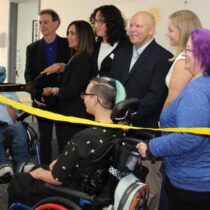
August is National Breastfeeding Month. The United States Breastfeeding Coalition (USBC) established the designation in August 2011. The group is trying to promote, support, and normalize breastfeeding for mothers and their babies.
Here in Montgomery County, about 96% of new mothers start breastfeeding after their baby is born. That is higher than the statewide rate of 86%, according to Nicole Sadorra, a nurse and lactation consultant at Adventist HealthCare Shady Grove Medical Center.
“While most women start out breastfeeding their baby, only 29% of infants in Maryland are exclusively breastfed at six months,” Sadorra said.
That percentage falls far short of the American Academy of Pediatrics (AAP) recommendation which encourages all women to exclusively breastfeed their babies for the first six months. The Academy also supports continued breastfeeding even after parents introduce food to their baby.
Concerns About Racial Disparities
One concern often raised is the racial disparities among women who breastfeed. Research shows more than 80% of Asian, White, and Hispanic women will try breastfeeding, while the rate among American Indian, Alaskan Native or Black mothers drops to less than 80%.
“Healthcare professionals and community organizations must prioritize increasing breastfeeding education and offer outpatient support to these communities. By doing so, we can help reduce health disparities and ensure all babies have the best possible start in life,” Sadorra said.
Benefits of Breastfeeding
The benefits of breastfeeding are numerous. Breastfed babies have a lower risk of developing a number of diseases such as asthma, Type 1 diabetes, ear infections, gastrointestinal issues, respiratory problems, and SIDS. Mothers also can benefit. They often develop a lower risk for type 2 diabetes, high blood pressure, and ovarian and breast cancers.
Mothers Decide How They Want to Feed Their Babies
While many doctors recommend new mothers breastfeed, it is not always the right choice for some women.
“At Shady Grove, we believe that supporting the unique bond between mother and baby is at the heart of lactation care. While we advocate for the lifelong health benefits of breastfeeding, we also deeply respect and honor each mother’s choice in how to feed their baby. If breastfeeding is not the chosen path, we are here to provide guidance and support, whether that means exclusively pumping or safely managing breastmilk suppression. Our goal is to ensure that every mother feels empowered and confident in her feeding journey,” Sadorra said.
Some women who want to breastfeed struggle in the beginning. It is fairly common for women to feel frustrated or overwhelmed if their baby is not quite in sync with them.
“Breastfeeding can be both rewarding and challenging. Different issues can arise as your baby grows. Early on, many mothers experience latching difficulties and nipple soreness. These are common problems as both mother and baby learn the ropes. As time goes by, other challenges, like clogged milk ducts or concerns about milk supply may come up,” Saddora explained.
Returning to Work Can Be Challenging
Breastfeeding can be hard for women especially if they are working mothers and have to return to the office weeks after giving birth.
Saddora recommends women plan ahead to ensure the transition back to work goes smoothly. She said it is important for women to get comfortable with a breast pump before returning to work. She also suggests women talk with their boss about their pumping needs. New moms should discuss where and when they can pump. They also need to know how they can store their milk while at work.
Lactation Help for Women
Adventist Healthcare Shady Grove Medical Center has a staff of International Board Certified Lactation Consultants. They can help guide new mothers as they navigate the best course to feed their child.
“We also encourage breastfeeding parents to join our Shady Grove Parenting and Childbirth classes and our Discovering Motherhood Support Group where you can connect with others who are on a similar path and learn from their experiences,” Saddora said.
Shady Grove also offers human donor breast milk. Less than 20% of all hospitals around the country offer this service. Donor milk is offered to all patients in the well-baby nursery. Therefore, an infant can continue to receive human milk when moms face challenges or health concerns with breastfeeding.
Here is a link for more information about Shady Grove’s classes and support groups:
https://www.adventisthealthcare.com/services/pregnancy-birth/parenting-childbirth-classes


Comments are closed.